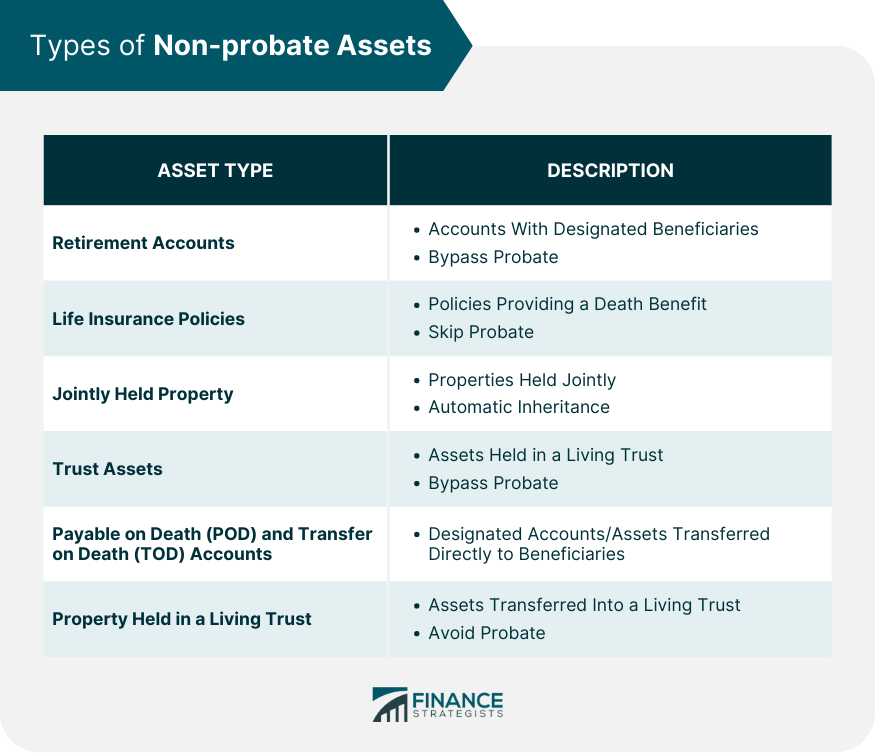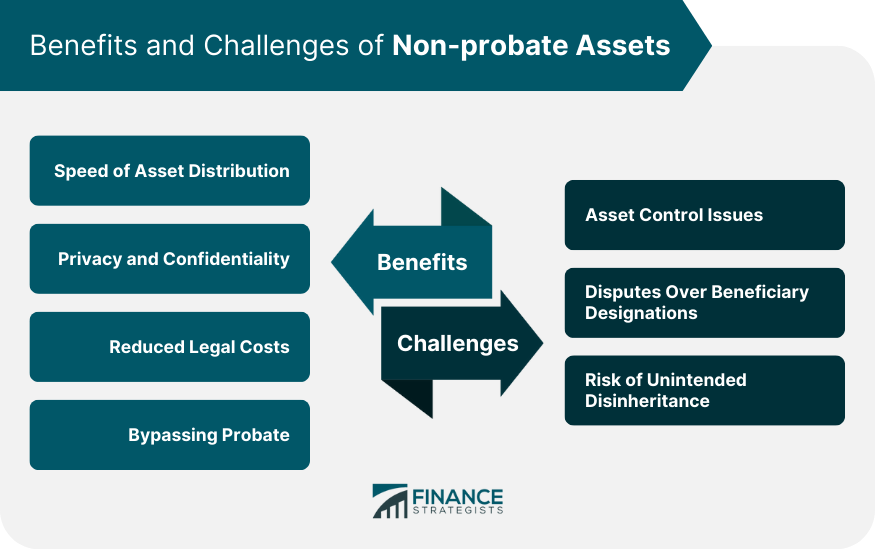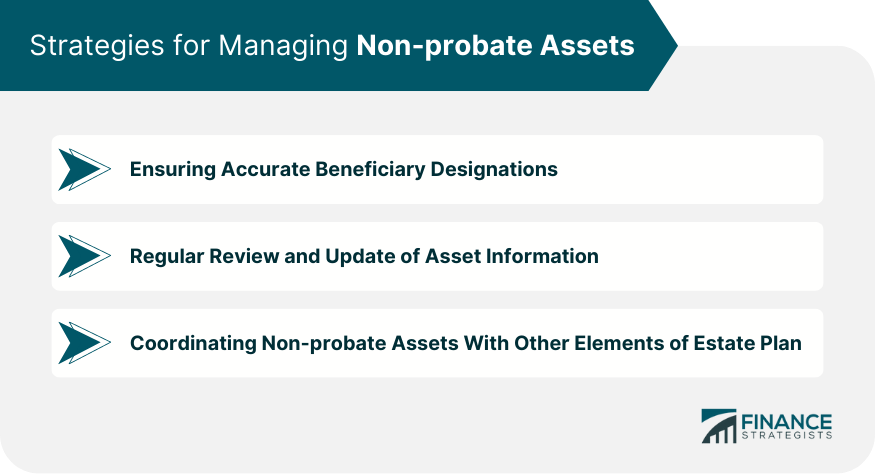Non-probate assets are items of value that don't go through the probate process when an individual dies. In essence, these assets are distributed directly to the designated beneficiaries without having to go through court proceedings. They are separated from the deceased's probate estate and are not subject to estate administration under the deceased's last will. Probate assets are those that the deceased owned solely in their name at the time of their death. They are subject to probate, a legal process through which a court oversees the distribution of these assets according to the deceased's will. If there's no will, the probate assets are divided following the state's intestacy laws. On the other hand, non-probate assets bypass this process, flowing directly to the designated beneficiaries. The contrast between probate and non-probate assets lies in their distribution process after the owner's death. Retirement accounts like Individual Retirement Accounts (IRA), 401(k)s, and other pension plans are non-probate assets. These accounts have designated beneficiaries who are entitled to the funds upon the account owner's death. As non-probate assets, the proceeds from these accounts bypass probate and are distributed directly to the beneficiaries. A life insurance policy is a contract with an insurance company that, in exchange for premium payments, provides a lump-sum payment to beneficiaries upon the insured's death. This payout, known as a death benefit, is a non-probate asset. Therefore, the death benefit is paid directly to the beneficiaries, avoiding the probate process entirely. Jointly held properties with rights of survivorship are considered non-probate assets. If a property is held jointly, upon one owner's death, the surviving owner(s) automatically inherit the deceased's share of the property. This occurs outside of probate and is independent of the deceased's will. Trusts are legal arrangements that allow third parties, or trustees, to hold and manage assets for the benefit of others. Assets held in a living trust are non-probate assets. Upon the grantor's death, the trustee oversees the distribution of these assets directly to the trust's beneficiaries, skipping probate. POD and TOD designations are common ways to avoid probate. When the account or asset owner dies, POD and TOD assets are transferred directly to the named beneficiaries. These designations are often used for bank accounts, investment accounts, and titles for vehicles or real estate. Living trusts, also known as revocable trusts, are created during a person's lifetime. The grantor (the person who creates the trust) transfers ownership of their assets into the trust. Upon their death, these assets bypass probate and go directly to the trust's beneficiaries. This expedient process is a significant benefit of non-probate assets. One significant advantage of non-probate assets is the speed of distribution. Probate can be a time-consuming process, often taking months, or even years, to finalize. However, non-probate assets bypass this process, allowing beneficiaries to receive their inheritances much sooner. Probate is a public process, which means the deceased's assets, debts, and the named beneficiaries become part of the public record. By contrast, non-probate assets maintain privacy as they pass directly to beneficiaries without court involvement or public disclosure. The probate process often incurs substantial court and attorney fees. As non-probate assets don't go through probate, they can significantly reduce or even eliminate these costs, leaving more of the estate for the beneficiaries. Perhaps the most significant benefit is that non-probate assets bypass the probate process altogether. Probate can be lengthy and complex, often involving court appearances, paperwork, and potential disputes among heirs. By avoiding this process, non-probate assets can be a significant part of efficient estate planning. While non-probate assets can be beneficial, they also come with potential challenges that require careful planning and management. With non-probate assets, you may run into challenges related to control. For example, joint property ownership can lead to disagreements about the use or management of the property. Similarly, for trust assets, the grantor cedes control to the trustee, who then has a fiduciary duty to manage the trust for the beneficiaries. This can be problematic if the trustee does not manage the trust according to the grantor's intentions. Another common challenge involves disputes over beneficiary designations. This typically arises when the deceased failed to update their designated beneficiaries after significant life changes, such as divorce or the birth of a child. It could lead to legal battles among potential heirs and possibly unintended beneficiaries receiving the assets. There's also a risk of unintended disinheritance with non-probate assets. For instance, if you remarry and update your will to include your new spouse but forget to update your beneficiary designations on your retirement accounts or life insurance policies, those assets could go to your previous spouse. That would unintentionally disinherit your current spouse as a result. Due to the potential challenges associated with non-probate assets, it's essential to adopt strategies for effective management. To avoid disputes and unintended inheritances, it's crucial to ensure that your beneficiary designations on all non-probate assets are current and accurate. Every time you experience a significant life event, like marriage, divorce, the birth of a child, or the death of a beneficiary, review and update your beneficiary designations as necessary. In addition to keeping beneficiary designations current, you should conduct a regular review of all your assets. Make sure your records are up to date and reflect your current financial situation. Regular reviews will also help you identify any assets that you may have forgotten to include in your estate plan. Lastly, your non-probate assets should be coordinated with the other elements of your estate plan. Your will, trust documents, powers of attorney, and healthcare directives should all work together with your non-probate assets to create a comprehensive estate plan that meets your goals and provides for your loved ones. Working with an experienced estate planning attorney can ensure that all components of your estate plan are effectively coordinated. Non-probate assets provide an efficient means of transferring wealth upon death without the need for the often lengthy and costly probate process. These assets include jointly held properties, retirement accounts, life insurance policies, trust assets, as well as payable on death and transfer on death accounts. While they offer many benefits, such as speed of asset distribution, privacy, and reduced legal costs, they also present potential challenges, like asset control issues, disputes over beneficiary designations, and the risk of unintended disinheritance. Given these complexities, it's essential to seek legal guidance when handling non-probate assets. A seasoned estate planning attorney can provide invaluable advice on managing these assets, ensuring your estate plan reflects your current life circumstances, and your wishes are carried out after your passing.What Are Non-probate Assets?
Types of Non-probate Assets
Retirement Accounts
Life Insurance Policies
Jointly Held Property
Trust Assets
Payable on Death (POD) And Transfer on Death (TOD) Accounts
Property Held in a Living Trust

Benefits of Non-probate Assets
Speed of Asset Distribution
Privacy and Confidentiality
Reduced Legal Costs
Bypassing Probate
Potential Challenges With Non-probate Assets
Asset Control Issues
Disputes Over Beneficiary Designations
Risk of Unintended Disinheritance

Strategies for Managing Non-probate Assets
Ensuring Accurate Beneficiary Designations
Regular Review and Update of Asset Information
Coordinating Non-probate Assets With Other Elements of Estate Plan

Final Thoughts
What Are Non-probate Assets? FAQs
Non-probate assets are items of value that bypass the probate process and pass directly to the designated beneficiaries upon an individual's death.
Unlike probate assets, which are subject to court-supervised probate process, non-probate assets are distributed directly to beneficiaries without court involvement.
Non-probate assets include retirement accounts, life insurance policies, jointly held property, trust assets, and payable on death or transfer on death accounts.
Non-probate assets can expedite asset distribution, maintain privacy, reduce legal costs, and bypass the often lengthy probate process, making them an essential component of effective estate planning.
Non-probate assets can lead to issues such as control disputes, conflicts over beneficiary designations, and the risk of unintended disinheritance. Therefore, it's important to manage these assets carefully.
True Tamplin is a published author, public speaker, CEO of UpDigital, and founder of Finance Strategists.
True is a Certified Educator in Personal Finance (CEPF®), author of The Handy Financial Ratios Guide, a member of the Society for Advancing Business Editing and Writing, contributes to his financial education site, Finance Strategists, and has spoken to various financial communities such as the CFA Institute, as well as university students like his Alma mater, Biola University, where he received a bachelor of science in business and data analytics.
To learn more about True, visit his personal website or view his author profiles on Amazon, Nasdaq and Forbes.











